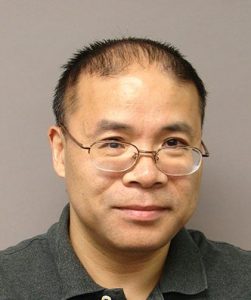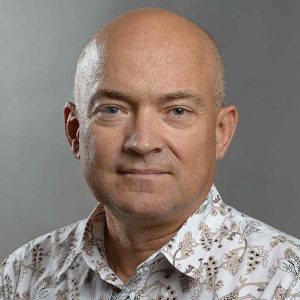
Dec. 28, 2016
Shi-Jie Chen
The current experiments on structural determination for RNA molecules cannot keep up the pace with the steadily emerging RNA sequences and new functions. This underscores the request for an accurate model for RNA three-dimensional (3D) structural prediction. Although considerable progress has been made in mechanistic studies, accurate prediction for RNA tertiary folding from sequence remains an unsolved problem. The first and most important requirement for predicting of RNA structure from physical principles is an accurate free energy model. Based on rigorous physical principles, Chen’s lab is developing computational models to predict 3D tertiary structures, energy landscapes, and kinetic mechanisms for…

Dec. 28, 2016
Min Soon Kim
Dr. Min Soon Kim is an Assistant Professor at the Department of Health Management and Informatics at the University of Missouri at Columbia. He received his M.S. and Ph.D. degrees in Biomedical Engineering at the University of Texas at Austin. Dr. Kim had excellent research opportunities in collaboration with interdisciplinary researchers in a range of areas within biomedical informatics, including health information technology evaluation, public health informatics and clinical research informatics. Prior to joining to HMI, he has served as a research fellow at the Center for Biomedical Informatics, Mount Sinai School of Medicine, NYC, NY. Prior to postdoctoral experience,…

Dec. 28, 2016
Timothy Matisziw
Dr. Tim Matisziw is an Associate Professor at University of Missouri-Columbia (MU) with a joint appointment in the Department of Geography, Department of Civil & Environmental Engineering, and MU Institute for Data Science and Informatics. He is also the Director of the United States Geospatial Intelligence Foundation (USGIF) accredited Geospatial Intelligence Certificate program (graduate and undergraduate) at MU. He regularly teaches courses in geographic information systems (GIS), transportation geography, location analysis and site selection, and the geospatial sciences in national security. His primary areas of interest and expertise include transportation systems, spatial optimization, geographic information, and spatial decision support systems. Dr.

Dec. 28, 2016
Joi Moore
Dr. Moore received her B.S. degree in Computer Science and M.S. degree in Management from North Carolina State University, both focusing on a minor in Management Information Systems. After teaching for two years in the Department of Computer Information Systems at Shaw University, Dr. Moore turned her attention to earning her Ph.D. in Instructional Technology from the University of Georgia with a cognate area of Management Information Systems. Her current research agenda is the application of appropriate design principles for computer-based environments that support learning and/or effectively improve a desired performance. She has served as President of the Training and…

Dec. 28, 2016
Eduardo Simoes
My research and teaching interests include: use of health management and informatics to improve planning, policy development, management and evaluation of health care, public health programs and global health initiatives. Use information technology to address surveillance of preventable diseases and their complications in order to tailor health programs and activities. Health care service and outcome research. Teaching of epidemiology, preventive medicine and public health applications of information technology.

Dec. 28, 2016
Toni Kazic
Toni Kazic is an associate professor in the Electrical Engineering and Computer Science Department at the University of Missouri. She is currently working on methods to infer the structure of complex networks using the disease lesion mimic mutants of maize as a model system. Her work has included the development of an architecture for community query, deposit, review and curation of information on biochemical reactions, and the analysis of extant reaction networks. Kazic is a fellow of the American College of Medical Informatics and was an Invited Researcher to the Institute for New Generation Computer Technology. She served as a…

Dec. 28, 2016
Dong Xu
Dong Xu is Curators’ Distinguished Professor in the Department of Electrical Engineering and Computer Science, with appointments in the Christopher S. Bond Life Sciences Center and the Informatics Institute at the University of Missouri-Columbia. He obtained his Ph.D. from the University of Illinois, Urbana-Champaign in 1995 and did two years of postdoctoral work at the US National Cancer Institute. He was a Staff Scientist at Oak Ridge National Laboratory until 2003 before joining the University of Missouri, where he served as Department Chair of Computer Science during 2007-2016 and Director of Information Technology Program during 2017-2020. Over the past 30+…

Dec. 28, 2016
Suzanne Boren
Dr. Boren’s research focuses on two themes 1) Consumer Health Informatics, and 2) Health Administration and Health Informatics Education. Through her research, Dr. Boren investigates how informatics can be used to improve patient outcomes and student learning outcomes. Dr. Boren has co-authored more than 90 articles. These publications provide valuable information on decision support technologies, telemedicine, E-health / mobile health, management of chronic illness, and education. Two of Dr. Boren’s articles have been recognized by the Yearbook of the International Medical Informatics Association as among the best biomedical informatics studies. Dr. Boren has a history of service. Dr. Boren directs…

Dec. 28, 2016
Mihail Popescu
Mihail Popescu has received a MS in Medical Physics in 1995, a MS in Electrical Engineering in 1997 and a PhD in Computer Science in 2003 from the University of Missouri, Columbia, Missouri. Dr. Popescu has published seven articles in refereed journals, 20 conference papers, one book, and one book chapter. His research focus has been on eldercare technologies, medical decision making, and epigenetic pattern discovery.